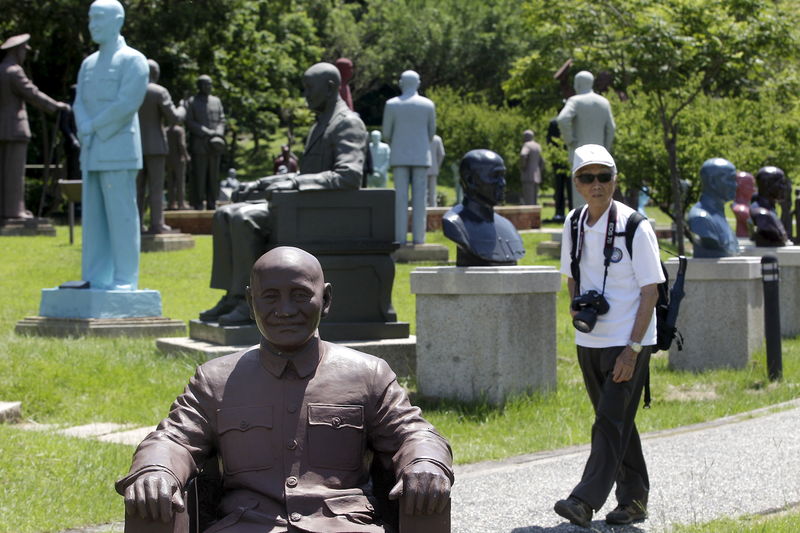By J.R. Wu
TAOYUAN, Taiwan (Reuters) - Dumped outside Chiang Kai-shek's mausoleum in Taiwan are nearly 200 unwanted statues of the Nationalist Party hero, a suggestion of the punishment his party faces in January elections for pushing the self-ruled island too close to political foe China.
Cast in bronze and in different shades of red, brown, grey and blue, the generalissimo is saluting, holding a book, leaning on a cane, sitting regally or perched on a plinth - a peaceful if surreal gathering that belies the disarray of the party it represents.
Some statues still standing elsewhere around the island have been decapitated or defaced.
The Nationalist Party, or Kuomintang (KMT) in Chinese, is expected to be dealt a thrashing in the presidential poll by the pro-independence Democratic Progressive Party (DPP), a result likely to irritate giant neighbour China which claims the island as its own, though no one expects close economic ties to unravel.
"The KMT is in freezing winter. It will get worse before it gets better," said a party member, who spoke on condition of anonymity because of the sensitivity of the issue.
The party has been in crisis mode since November when it lost power in local elections. The defeat paved the way for Hung Hsiu-chu to step up as its only prospective presidential candidate. But her stated intention of signing a peace treaty with China and appearing to move closer to Beijing's position of "one China", including Taiwan, has rubbed a lot of party cadres the wrong way.
In short, KMT supporters are bailing out. Campaign jockeying and factional infighting are pushing members away from a party that numbered well over a million in 2000 but is now down to about 890,000, with only about a third of them active.
Mainstream public opinion on the island is in favour of maintaining the status quo with China, which is a key campaign message from DPP presidential hopeful Tsai Ing-wen. Economic ties, while seen as imbalanced in favour of China, won't be rolled back however distant the prospect of political talks.
Beijing, for instance, insists Taiwan can be ruled under the "one country, two systems" formula under which Hong Kong, a former British colony, returned to Chinese rule in 1997. Both the DPP and KMT reject this model, which prompted unprecedented pro-democracy protests in Hong Kong last year, blocking streets for months.
SLOWING GROWTH, STAGNANT WAGES
Chiang remains a hero for some in Taiwan, and even in China he is looked upon with increasing favour in certain quarters, despite his forced flight to Taiwan in 1949 with the remains of his Republic of China government after the Communists won the Chinese civil war.
Chiang died in 1975. China continues to claim Taiwan as its territory, and has never renounced the use of force to bring the now proudly democratic island under its control.
Late last month, legislator Chang Sho-wen publicly quit the KMT. Another member, Hsu Hsin-ying, left the party after last year's local election loss which forced President Ma Ying-jeou to resign as party chief.
The election result was seen as a vote against Ma's China-friendly policies. Democratically minded young and middle-class Taiwanese, unhappy with slowing economic growth and stagnant wages, remain suspicious of China's intentions and see only big business prospering from closer ties.
"The history of the KMT, of Chiang, has been diluted," said Hsu Wen-long, 50, whose father, a KMT soldier, fled to Taiwan with the generalissimo. When Hsu was young, children were taught it was a fight for survival between the KMT and the Communists. That is not the case with the younger generation.
"What you learn in your early years stays with you for a lifetime," Hsu said.
The hundreds of twenty-somethings who occupied parliament last year to stop a trade pact that would bring the island even closer to China were at primary school under the last DPP rule.
But some Nationalists argue that stronger ties with China will help prevent Beijing from taking control any way it wants.
"If the KMT should become weak or split up, there will be no checks and balances against the DPP," said Nationalist Justin Chen. "If in Taiwan society there doesn't exist a voice of unification, then China's Communist Party will reach its hand directly into this island. That is a different stage of confrontation."
As for those busts and statues, the DPP's Chen Shui-bian ordered them to be taken down from public display and sent to the wooded, lakeside park in Taoyuan when he was president between 2000 and 2008.

As late as last year, they were still being delivered.